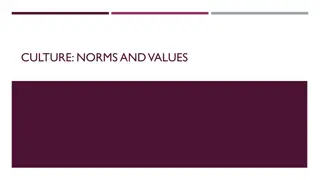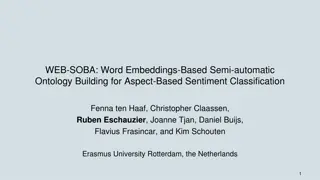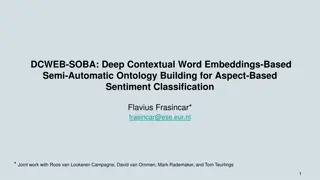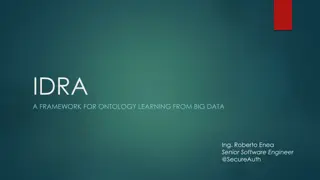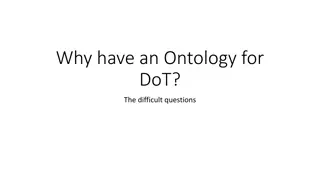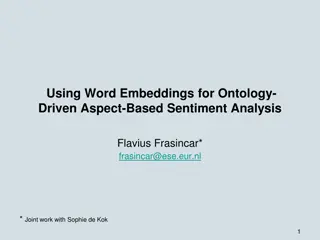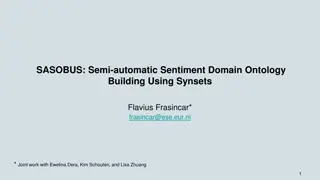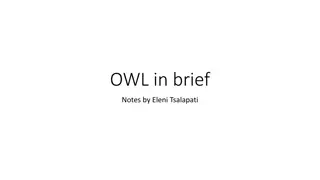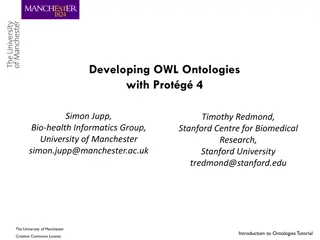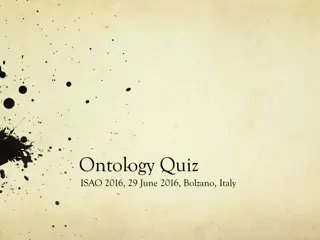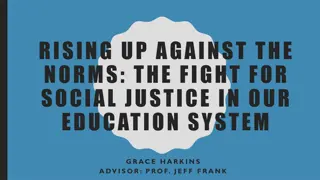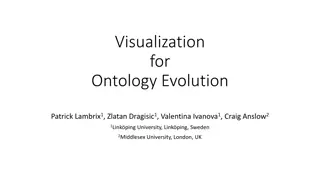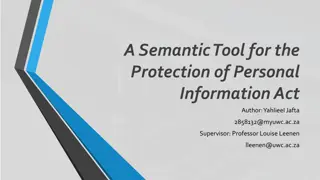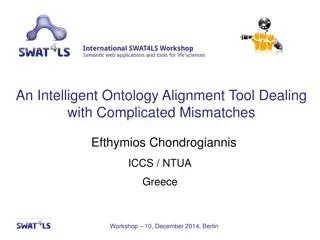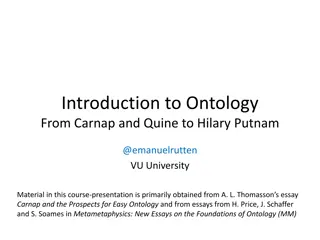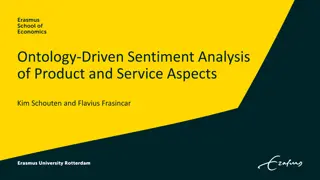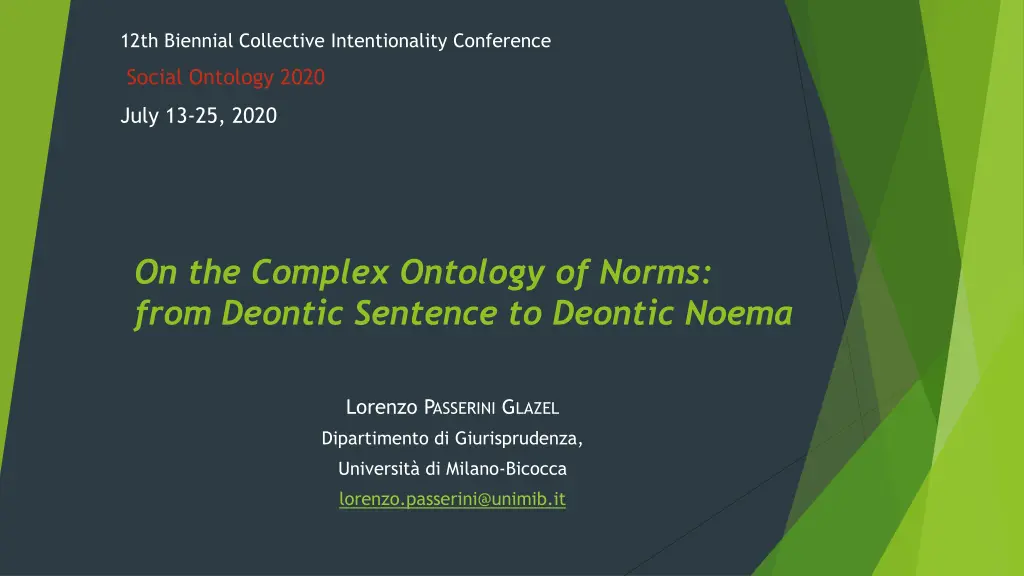
Complex Ontology of Norms: Defining Entities and Properties
Explore the intricate nature of norms and their role in shaping social reality. Delve into the challenges of defining norms, understanding their intension and referents, and identifying their essential properties. Join Lorenzo Passerini Glazel in unraveling the complexity of norms from deontic sentences to deontic noemas in the context of the Social Ontology 2020 conference.
Download Presentation

Please find below an Image/Link to download the presentation.
The content on the website is provided AS IS for your information and personal use only. It may not be sold, licensed, or shared on other websites without obtaining consent from the author. If you encounter any issues during the download, it is possible that the publisher has removed the file from their server.
You are allowed to download the files provided on this website for personal or commercial use, subject to the condition that they are used lawfully. All files are the property of their respective owners.
The content on the website is provided AS IS for your information and personal use only. It may not be sold, licensed, or shared on other websites without obtaining consent from the author.
E N D
Presentation Transcript
12th Biennial Collective Intentionality Conference Social Ontology 2020 July 13-25, 2020 On the Complex Ontology of Norms: from Deontic Sentence to Deontic Noema Lorenzo PASSERINI GLAZEL Dipartimento di Giurisprudenza, Universit di Milano-Bicocca lorenzo.passerini@unimib.it
Norm: what is it? Das Bekannte berhaupt ist darum, weil es bekannt ist, nicht erkannt. What is familiar is not known, just for the reason that it is familiar. Among the phenomena to which G.W.F. Hegel s words are fit, there are certainly norms. 1 Lorenzo PASSERINI GLAZEL - On the Complex Ontology of Norms: from Deontic Sentence to Deontic Noema - Social Ontology 2020
We daily act with reference to norms: a large part of our behaviors, of our interpersonal relationships, even of our thoughts, is determined or influenced by a variety of rules and norms. We live in a plurality of normative landscapes. Norms play an essential role in the construction of the social reality in which we live, and they are themselves part of such reality. This is possible in virtue of what has recently been dubbed by Giuseppe Lorini (2017; 2018) nomic capacity , i.e. the capacity to act with reference to norms. 2 Lorenzo PASSERINI GLAZEL - On the Complex Ontology of Norms: from Deontic Sentence to Deontic Noema - Social Ontology 2020
However, if we consider the question What is a norm?, we cannot find an obvious answer to such a seemingly trivial question. Even in the context of social sciences dealing with normative phenomena - such as ethics, jurisprudence, legal theory, or the sociology of law - the concept of norm is either taken for granted and not given any explicit definition, or else it is given a plurality of provisional, unsatisfying, and conflicting definitions that either omit phenomena we usually refer to as norms or include phenomena we wouldn t usually refer to as norms. 3 Lorenzo PASSERINI GLAZEL - On the Complex Ontology of Norms: from Deontic Sentence to Deontic Noema - Social Ontology 2020
The problem of the definition of the word norm The problem of the INTENSION of the word norm : The problem of the REFERENTS of the word norm : What are the properties of norms? What are the entities designated by the word norm ? 4 Lorenzo PASSERINI GLAZEL - On the Complex Ontology of Norms: from Deontic Sentence to Deontic Noema - Social Ontology 2020
On the INTENSION of the word norm Different kinds of normativity Different degrees of normativity Prescriptive norms in terms of obligation to do or not to do Permissive norms Constitutive rules Technical rules Stochastic rules Strict prescription Urging Warning Recommendation Advice Nudge 5 Lorenzo PASSERINI GLAZEL - On the Complex Ontology of Norms: from Deontic Sentence to Deontic Noema - Social Ontology 2020
On the REFERENTS of the word norm There is no general agreement on what kind of entities are designated by the word norm . In many contexts, such as the context of law, legal philosophy and jurisprudence, there is a tendency to consider norms as linguistic entities There are contexts, indeed, (such as modern positive law) in which norms are strictly linked to or created through specific normative speech acts However, in other contexts language merely gives expression to pre-existing norms, and sometimes norms operate on behaviours independently of their being expressed or even expressible. 6 Lorenzo PASSERINI GLAZEL - On the Complex Ontology of Norms: from Deontic Sentence to Deontic Noema - Social Ontology 2020
The phenomenon of normativity intersects a plurality of different orders of phenomena, such as linguistic, psychical, social, ethical, legal, biological, neurological, ethological, an so on. It is consequently investigated by a plurality of different sciences and disciplines. Each science or discipline has its own theoretical and methodological presupposition, which make it possible to investigate a specific order of phenomena, to the unavoidable detriment of other orders of phenomena. As a consequence, the very concept of norm , diffracting and refracting in a plurality of different conflicting conceptualizations, seems to dissolve and vanish. 7 Lorenzo PASSERINI GLAZEL - On the Complex Ontology of Norms: from Deontic Sentence to Deontic Noema - Social Ontology 2020
Four possible theoretical approaches 1. Acknowledging the reality of norms in one domain and considering related phenomena in other domains to be subordinate or metonymic to it. 2. Acknowledging the reality of norms as a necessary combination of related phenomena in two or more different domains. 3. Dropping the concept of norm as misleading and incapable to single out definite phenomena. 4. Mapping the different phenomena to which the term norm may variously refer, and then examining their possible relationships. 8 Lorenzo PASSERINI GLAZEL - On the Complex Ontology of Norms: from Deontic Sentence to Deontic Noema - Social Ontology 2020
Seven possible referents of the word norm Amedeo G. Conte 2006, 2017: the word may designate five different entities I suggest to add three more 9 Lorenzo PASSERINI GLAZEL - On the Complex Ontology of Norms: from Deontic Sentence to Deontic Noema - Social Ontology 2020
1. Deontic sentence In the norm One ought to pay one s debts there are six syllables . The entity which is made of six syllables is a deontic sentence. The norm n is ambiguous . Ambiguity is a property of a deontic sentence which can express two or more propositions (meanings). 10 Lorenzo PASSERINI GLAZEL - On the Complex Ontology of Norms: from Deontic Sentence to Deontic Noema - Social Ontology 2020
2. Deontic utterance Prohibiting without discrimination to all Arabs from entering the US immediately after 9/11 would have been an ill-timed norm (Conte 2006, 2017). Prohibiting is here a speech act consisting in a deontic utterance of a deontic sentence. 11 Lorenzo PASSERINI GLAZEL - On the Complex Ontology of Norms: from Deontic Sentence to Deontic Noema - Social Ontology 2020
3. Deontic proposition The English sentence One ought to pay one s debts and the French sentence Il faut payer ses dettes express the same norm (Conte 2006, 2017). What is expressed by both sentences is a deontic proposition (understood as a specifically semantic entity). 12 Lorenzo PASSERINI GLAZEL - On the Complex Ontology of Norms: from Deontic Sentence to Deontic Noema - Social Ontology 2020
Interlude: Are norms linguistic entities? The first three referents are linguistic entities (deontic sentence and deontico utterance), the correlate of a linguistic entity (deontic proposition). Many theories of norms, especially in the domain of legal theory, tend to focus on the linguistic referents of the word norm . They are more tangible and as such more easily determined and intersubjectively recognizable. Norm-creating acts, which are acts of will, necessarily imply a linguistic manifestation. However, this but one side of normativity. The other side is that of normative experience. Normative experiences may obviously be aroused through linguistic norm- creating acts, but they may as well autonomously arise independently of any norm- creating act or linguistic formulation of a norm. 13 Lorenzo PASSERINI GLAZEL - On the Complex Ontology of Norms: from Deontic Sentence to Deontic Noema - Social Ontology 2020
4. Deontic state-of-affairs Sachsenspiegel (The Saxon Mirror) is a codification of norms in force in the society of its author, Eike von Repgow (Conte 2006, 2017). The norms codified by Eike von Repgow are deontic states-of-affairs obtaining among the Saxons around 1200 a.D. It is also a deontic state-of-affairs obtaining in Italy at the present time the ban on smoking in enclosed public places. 14 Lorenzo PASSERINI GLAZEL - On the Complex Ontology of Norms: from Deontic Sentence to Deontic Noema - Social Ontology 2020
A deontic state-of-affairs is the deontic analogon of an ontic state-of-affairs Sentence Proposition State-of-affairs The words: The cat is on the table The meaning: The being on the table of the cat The cat is on the table The words: The meaning: The being forbidden to smoke in enclosed public places It is forbidden to smoke in enclosed public places It is forbidden to smoke in enclosed public places 15 Lorenzo PASSERINI GLAZEL - On the Complex Ontology of Norms: from Deontic Sentence to Deontic Noema - Social Ontology 2020
5. Deontic object According to Benveniste (1948), Latin ablative comparative (such as melle dulcior , sweeter than honey ) is used to evaluate the quality of an object by comparing it to another object taken as an unchanging norm. The standard railway gauge (Canguilhem, 1966) has been established taking the Stockton-Darlington line as the norm. 16 Lorenzo PASSERINI GLAZEL - On the Complex Ontology of Norms: from Deontic Sentence to Deontic Noema - Social Ontology 2020
6. Deontic conduct (exemplary conduct) Alexander the Great charging into battle ahead of his soldiers. The conduct of a religious authority taken as the norm by the believers. The ancestors conduct taken as the norm in customary law. 17 Lorenzo PASSERINI GLAZEL - On the Complex Ontology of Norms: from Deontic Sentence to Deontic Noema - Social Ontology 2020
7. Deontic noema A norm proposed to a legislative chamber (Conte 2006, 2017). In the absence of a statutory provision, a court is to decide in accordance with customary law and, in its absence, in accordance with the rule it would make as legislator (art. 1 Code civile suisse). Deontic noema as a mental representation of a norm. Deontic noema a deontic state-of-affairs in intellectu. 18 Lorenzo PASSERINI GLAZEL - On the Complex Ontology of Norms: from Deontic Sentence to Deontic Noema - Social Ontology 2020
Is the concept of deontic noema a merely residual or parasitical concept? Just like it is not worth for the zoologist to study merely fantasy horses or hippogryphs, it should not be worth for the legal scholar to study merely fantasy norms. However, I will show that the concept of deontic noema may cast a light on many legal and normative phenomena, mostly when there is a normative experience or a norm obtaining independently of any linguistic norm- creating act. 19 Lorenzo PASSERINI GLAZEL - On the Complex Ontology of Norms: from Deontic Sentence to Deontic Noema - Social Ontology 2020
The basic norm as a merely thought norm in Kelsen Norm as the meaning of an act of will. There is no norm without a norm-creating authority ( keine Norm ohne eine normsetzende Autorit t ) . There are, nonetheless, merely thought norms (Kelsen, 1962[1960] : p. 13), as the contents of pure acts of thinking. The validity of all legal norms is based on the basic norm at the top of system of norms. The basic norm is not created by a legal authority, it is presupposed in a mere act of thought: it is a merely thought norm, a mere deontic noema. 20 Lorenzo PASSERINI GLAZEL - On the Complex Ontology of Norms: from Deontic Sentence to Deontic Noema - Social Ontology 2020
The effectiveness or operancy of the representation of the norm in Kelsen It is not the norm or the normative order, in their validity-existence [Geltungsexistenz] that become effective [wirksam, operating]. It is the fact that men represent to themselves [sich vorstellen] the norm or the normative order, and it is this representation [Vorstellung] what becomes effective [wirksam, operating], since it drives men to adopt the behavior corresponding to the representation of the norm (Kelsen, 1932[1926] : p. 8). The norm-representation (Normvorstellung, just like in Weber) in the agent s mind is a deontic noema. 21 Lorenzo PASSERINI GLAZEL - On the Complex Ontology of Norms: from Deontic Sentence to Deontic Noema - Social Ontology 2020
Deontic noema and deontic noesis In phenomenology, a noema is the objective correlate of a noesis. What kind of noesis is a deontic noesis? What is a normative experience, a normatives Erlebnis? 22 Lorenzo PASSERINI GLAZEL - On the Complex Ontology of Norms: from Deontic Sentence to Deontic Noema - Social Ontology 2020
Normative experience in Leon Petraycki (1867-1931) Psychological theory of law and ethics. Normative experience as the existence and operancy in our psyche of certain immediate combinations of action-representations and emotions rejecting or encouraging the corresponding actions (Petra ycki 2011[1909-1910]: 30-31). Norms and legal and moral obligations are nothing actually and effectively existing outside the minds of people asserting or denying their existence. They are mere reflections or projections of the psychical states of such people (Petra ycki 2011[1909- 1910]: 112). Norms are nothing but projections of the mind, emotional phantasms. 23 Lorenzo PASSERINI GLAZEL - On the Complex Ontology of Norms: from Deontic Sentence to Deontic Noema - Social Ontology 2020
Norms as emotional phantasms, and the theory of normative facts For Petra ycki a norm is neither a deontic sentence, nor a deontic utterance, a deontic proposition, a deontic state-of-affairs, a deontic object, a deontic conduct: inasmuch as it is an emotional phantasm, it is but a deontic noema, which is the correlate of a specific normative experience or deontic noesis. Normative experience may be spontaneous or positive (in the latter case, it comprises the representation of a normative fact, such as a deontic utterance, which is believed to have created it). Deontic sentences, utterances, propositions, states-of-affairs, objects, conducts are nothing but possible normative facts, however so only inasmuch as they actually happen to arouse a normative experience. The notion of deontic noema accounts for the afterward (apr s- coup) dimension of normative facts. 24 Lorenzo PASSERINI GLAZEL - On the Complex Ontology of Norms: from Deontic Sentence to Deontic Noema - Social Ontology 2020
The other side of normativity, norms without language, and the afterward dimension of norms The concept of deontic noema and the analysis of deontic noesis allows to account for the other side of normativity: non-linguistic normative experience (as opposed to the linguistic enactment of norms); the operancy (or effectiveness) of norms; language-independent norms (mute law and cryptotypes in R. Sacco, animal normativity, etc.); norms applied by analogy or from general legal principles; God s law; the formation of customary law from a conduct taken as deontic; of the afterwards (apr s-coup) dimension of normativity. 25 Lorenzo PASSERINI GLAZEL - On the Complex Ontology of Norms: from Deontic Sentence to Deontic Noema - Social Ontology 2020
With regard to the intellective mind [ ], the phantasmata [ ] play in it the r le of the senses. As soon as it asserts or denies that the thing is good or evil, it hunts for it or eschew it. This is the reason why the mind never thinks [ ] without a phantasma [ ]. Aristotle, On the Soul, III, VII, 3 Thank you! Lorenzo PASSERINI GLAZEL Dipartimento di Giurisprudenza (School of Law), University of Milano - Bicocca lorenzo.passerini@unimib.it 26 Lorenzo PASSERINI GLAZEL - On the Complex Ontology of Norms: from Deontic Sentence to Deontic Noema - Social Ontology 2020

